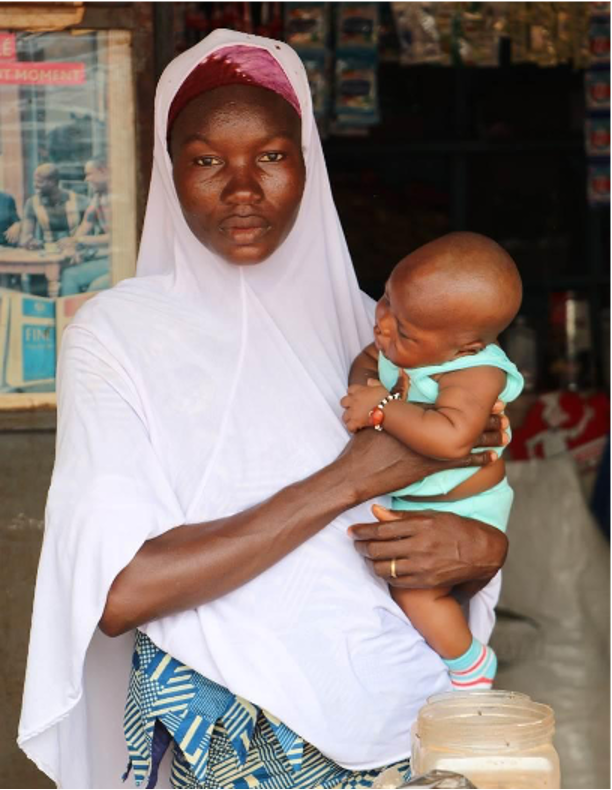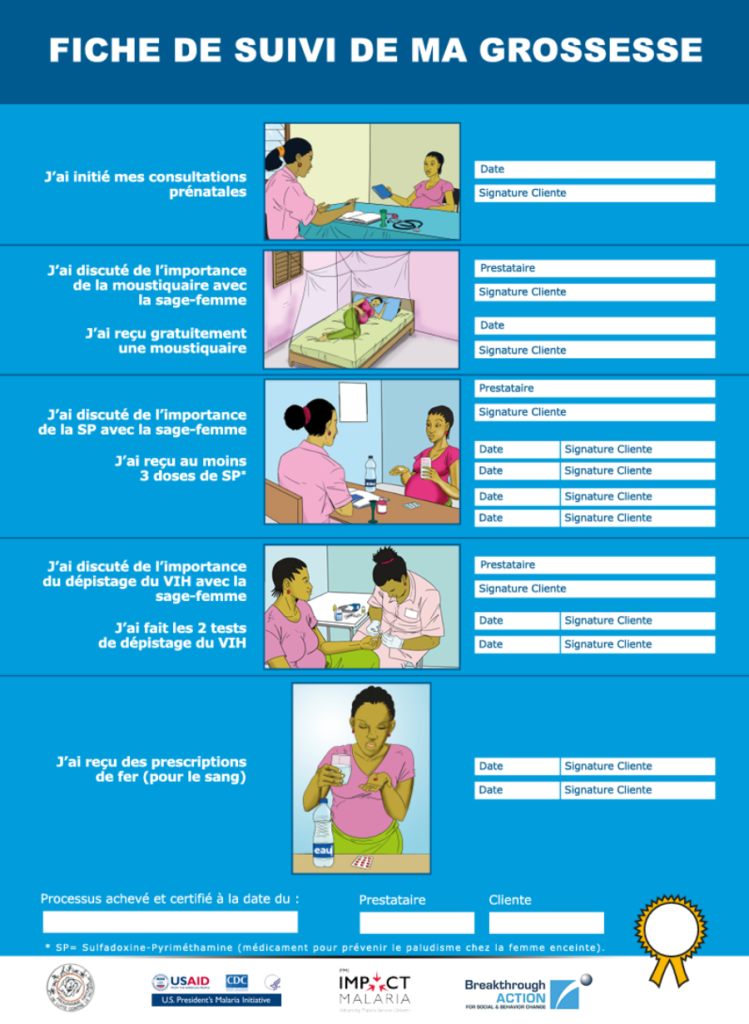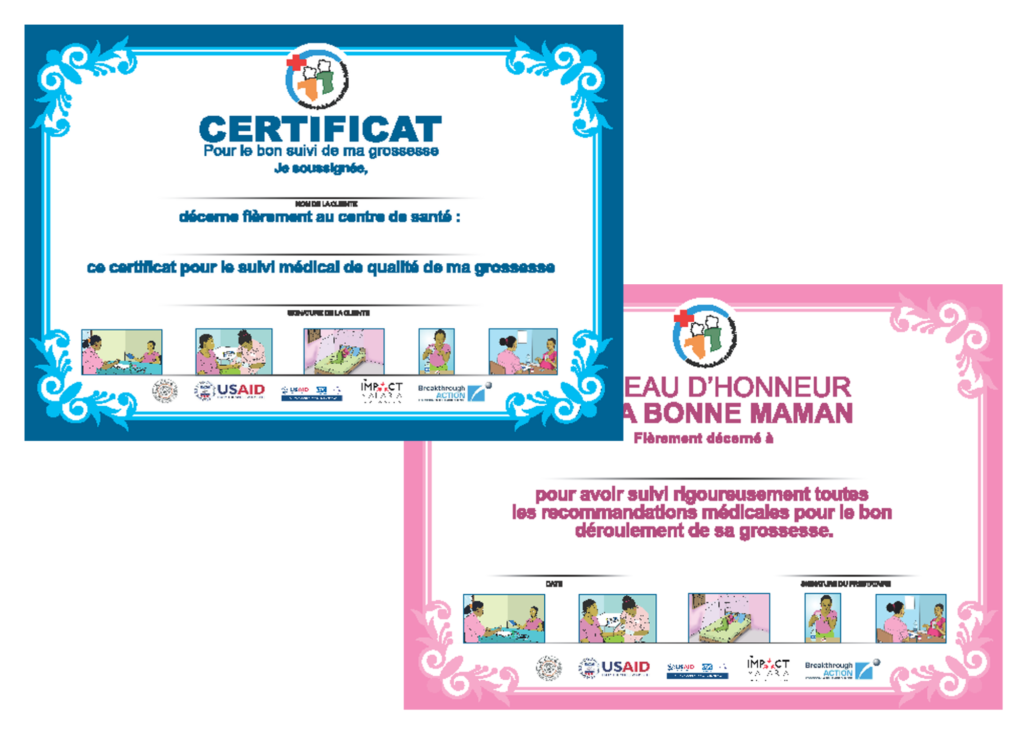Aminata, a mother of five in southern Côte d’Ivoire, expected her sixth pregnancy would be no different than the others. She would attend a few antenatal care appointments at her local health center, and with the help of a local midwife, she would give birth to a healthy baby.
This time, her pregnancy was different. When she brought home her baby boy, named Issouf, she also brought home a diploma to reward her for attending every antenatal care appointment.
“For my other children, when I was pregnant, I would go to the hospital just to pick up my antenatal care booklet”—a 110-page document health care providers use to track pregnancy details—“but I didn’t always return for appointments,” shared Aminata. She did not attend every scheduled appointment because she did not feel she needed to, since she did not feel sick.
“This time, when I went to get the booklet, the midwife congratulated me, saying that I had come early [and she gave me a checklist]. She told me that if I came to all my appointments, at the end of my pregnancy, I would ‘graduate’ and get a diploma of recognition.”

Aminata and her newborn son, Issouf. Photos by Benjamin Soro, Johns Hopkins Center for Communication Programs/Breakthrough ACTION Côte d’Ivoire.
At a pregnant woman’s first appointment, she receives an antenatal care booklet full of important, but sometimes confusing, information on how to ensure a healthy pregnancy. Insecticide-treated mosquito nets and medicine that prevents malaria during pregnancy are available during these appointments to protect mothers and their babies from potentially deadly malaria.
In a new initiative funded by the U.S. President’s Malaria Initiative, bright blue “Monitor My Pregnancy” checklists are tucked into these antenatal care booklets. Statements like, “I discussed the importance of sleeping under a mosquito net”; “ I received a mosquito net for free”; and “I discussed the importance of taking medication to prevent malaria in pregnancy and received three doses” line the checklists alongside colorful, descriptive graphics.
With the help of her “Monitor My Pregnancy” checklist, Aminata and her midwives co-certified her attendance at each scheduled ANC visit and the completion of each potentially life-saving service throughout her pregnancy. The services that line the checklist not only serve as reminders for quality care by midwives but also create a pact between the provider and patient to adhere to guidelines for services and counseling recommended by the World Health Organization and Ministry of Health for the prevention and treatment of malaria.
Once a patient completes all her required antenatal care appointments and the checklist is completely co-certified, the patient is rewarded with a diploma to take home with their new baby. “After I gave birth at the hospital, the midwife gave me my diploma. I was so happy. I came home and showed it to my husband and my other kids. Everyone was happy,” Aminata remembers with satisfaction.
When asked what Aminata plans to do with her diploma, she replies with pride: “I’ll keep it, and when Issouf grows up, I will show it to him.”
Pregnant women aren’t the only ones who receive a certificate. Patients can award their health center with a certificate to give feedback on the quality of antenatal services provided.
Marceline, a midwife, is grateful for the “Monitor My Pregnancy” checklists. “The ‘Monitor My Pregnancy’ checklist is very useful. It helps us as providers to not forget details and offer important services,” Marceline says. “The women are happy because we explain to them that the checklist allows them to monitor their pregnancy themselves.”
The U.S. President’s Malaria Initiative, the Côte d’Ivoire Ministry of Health, the National Malaria Control Program, and Breakthrough ACTION designed the “Monitor My Pregnancy” checklists to help midwives adhere to antenatal care guidelines to increase attendance by pregnant women. Like Aminata, nearly half of pregnant women in Côte d’Ivoire do not complete the minimum four antenatal appointments as the World Health Organization recommends. Sometimes, women do not regularly attend antenatal appointments because they perceive health providers as unwelcoming and unempathetic.
“Monitor My Pregnancy” checklists not only remind patients and providers of essential malaria-prevention services, but they also strengthen the relationships between midwives and their patients. Aminata remembers the midwives she met fondly, sharing: “The midwives there were very nice to me. They explained everything I had to do to protect my baby, and I did as they said because we had become like friends. I can even call them at any time when I need advice, and they answer kindly.”
Initially deployed in eight health centers, the “Monitor My Pregnancy” checklist approach has now been scaled up across 339 health care providers from 285 health centers in 17 districts across Côte d’Ivoire, with more health centers planning to adopt the tool in the near future.


